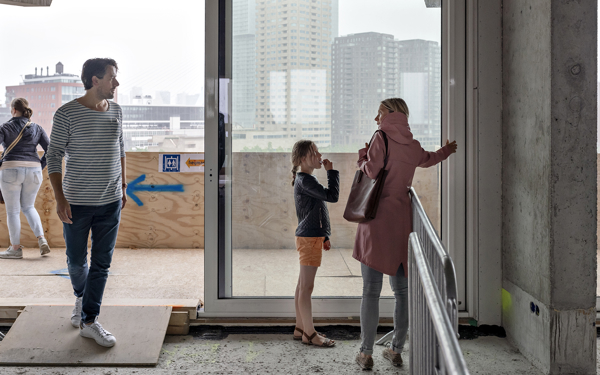Too few homes are being built in the Netherlands
The number of new homes built has long lagged behind demand. The higher interest rates are making it more expensive to build, so fewer projects are getting off the ground. In addition, prices of construction materials have risen, and building contractors are facing staff shortages. Tightened nitrogen regulations and other procedures are also putting additional pressure on newbuilds. It the Dutch housing market is to remain accessible, sufficient homes must be built in the coming years.
Fewer houses under water
Although house prices have been rising for some time, any price drop always remains a risk for homeowners. If prices fall rapidly, the value of a house may at some point become lower than the mortgage debt on the property. The house is then “under water”. This is a problem when you want to sell your house: the proceeds from the sale will not be enough to pay off the mortgage and you will be left with a residual debt.
In 2013, when the housing market crisis was at its worst, three in ten houses were under water. The risk of a sharp fall in house prices is less now than it was at the time of the financial crisis, though. In fact, with the recent sharp price increases, the risk of overvaluation is increasing again. As Dutch homeowners have high debt levels, DNB continues to monitor this. After all, having a home that is under water is not only problematic for homeowners, but also bad for the economy. This is because if your home is under water, you will generally have less money to spend, and that slows down the economy.
Solutions for the housing market
We have made a number of proposals to solve the problems in the Dutch housing market, and we list the most important ones below.
More new construction
In the coming years, many new homes will have to be built and the central government should play a coordinating role in the process. In particular, more affordable rental housing in the non-subsidised sector is needed. This will offer an alternative to those entering the housing market and not yet able to buy, giving them the opportunity to save toward the purchase of a home in due course without having to take on huge debts.
Reduce tax benefits for homeowners
There is a big difference between buyers and renters. People who own their home often have much lower housing costs than people who rent in the private sector due to tax benefits. We advise the government to further phase out financial benefits for homeowners. For example, by moving home equity from Box 1 to Box 3 for income tax purposes, or by incrementally increasing the notional rental value of a property. The government could then use the resulting revenues to lower income tax, for example. Of course, these tax benefits should be phased out very gradually, so homeowners do not suddenly face higher costs.
Tighten mortgage lending standards
In the Netherlands, we have high mortgage debts compared to other countries. Here, you can take out a mortgage up to 100% of the home's value. Moreover, the government makes it financially attractive to borrow money to buy a house. This means that many Dutch households have high mortgage debt, which makes them financially vulnerable. Indeed, if house prices fall sharply, homes may go under water. High mortgage debt also leads to high volatility in our economy. We recommend gradually reducing the maximum mortgage from 100% to 90% of the house price.
No measures that increase spending capacity
The government has taken several measures that allow first-time buyers in particular to make higher bids. Examples include the more widely available special loans and the abolition of transfer tax for first-time buyers. These measures are well-intentioned, but they actually lead to even higher house prices in the longer term. If you have more money to spend on a house, you can pay a higher price. And if more people do so, house prices will rise further.





